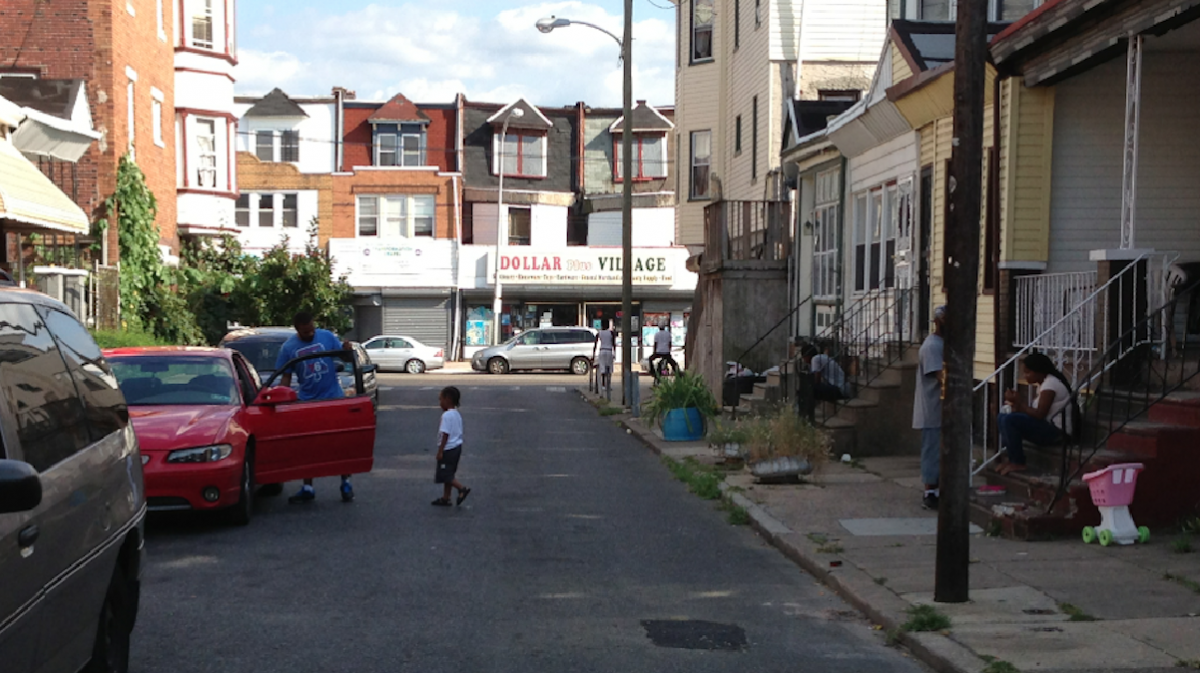Former child hero sentenced to 30-to-62 years in prison for Southwest Philly shooting

The section of the 1400 block of S. Allison St., where Marvin Brown was shot in June 2011. (Brian Hickey/WHYY)
Edward “Doobie” Sheed Jr., a former child hero convicted of a near-fatal shooting in Southwest Philadelphia, predicted he would get a lengthy sentence from Common Pleas Judge Charles Cunningham III on Tuesday.
He was right.
After Assistant District Attorney Morgan Model Vedejs ran through Sheed’s criminal record dating back to his juvenile years, and court-appointed defense attorney Daniel Alvarez requested to be removed from the case, Cunningham sentenced the 23-year-old to a maximum of 62 years in prison.
The attempted murder and weapons charges resulted from his July conviction for shooting 19-year-old Marvin Brown. That June 2011 shooting occurred on the street just feet from the home of Sheed’s grandmother.
Seeking a lesser sentence
Echoing his denials that appeared in a NewsWorks story, Sheed asked Cunningham to show leniency.
“[Vedejs] keeps saying I’m such a threat to the community, but I’m not a threat to the community,” said Sheed, who was handcuffed at the defense table wearing eyeglasses, a white thermal shirt and black track pants.
After Cunningham didn’t accept his request to be removed from the case, Alvarez — who is currently running against Seth Williams for District Attorney — requested a 10-to-20-year sentence.
He cited Sheed’s rough upbringing and lack of family support in his formative years as causes for leniency.
“He is a fairly intelligent young man,” said Alvarez. “There is a possibility he can be rehabilitated.”
Alvarez’s request would have been less than the 12.5-to-25-year plea deal that Sheed declined before trial on the grounds of innocence.
The sentencing hearing
Before Sheed entered Courtroom 708 around 10 a.m., Cunningham said that at a “quick glance,” the defendant’s motion for a new trial “looks like junk.”
Discussed once Sheed was in the room was a notarized affidavit from Monica Hill who claimed she was denied the opportunity to testify, a document that stated “Edward Sheed was not there” on the block when the shooting occurred.
When reading it onto the record, Alvarez pointed out that sayeth was improperly spelled “saith” and that “we didn’t call her [to the stand] for a very good reason.” He declined comment after sentencing.
Vedejs noted that only Hill’s printed name, and not a signature, appeared.
After those issues were raised, Alvarez told Cunningham that he thought Sheed being appointed new counsel “is in his best interest.”
“He gets one lawyer, and you are that lawyer,” said Cunningham, adding that he could get new counsel for his appeal, should one be filed.
“Manipulative” pattern
Making her case for a lenghty prison sentence, Vedejs said that Sheed has shown neither remorse for the shooting nor respect for the court, the latter tied to an outburst upon being convicted in which he “threw off his glasses” and blamed his attorney for the conviction.
She cited robbery and simple-assault arrests from his juvenile record, and referenced Sheed’s comments in the NewsWorks story saying he was merely a “lookout” in the robbery for which he was convicted; she said he was never charged in the lookout case, but for another robbery.
She also implied his father may not have really made him sell drugs as an 11-year-old (the story for which city officials and others lauded him as a boy hero) and noted that mental-health evaluators called him “manipulative” and “intimidating.”
Vedejs also spoke of Brown, who was unable to come to court for the sentencing hearing.
“The victim is, for all intents and purposes, a living vegetable,” she said, noting that this would have been a murder case hadn’t a police officer driven him to a hospital, where medical professionals were able to save his life. “He’d be serving a life sentence. Thirty-to-60 years is reasonable and appropriate to protect the community.”
Pleas go unheeded
Sheed said he didn’t recall the robbery cases which the prosecutor mentioned, three of which occurred when he was in child placement in Texas, courtesy of that 2002 drug case against his father.
“Show some type of leniency, if you can,” he said to Cunningham, who responded that the 60-year max being sought by Vedejs wasn’t actually the maximum penalty he could give.
When Cunningham sentenced Sheed to 30-to-62 years in state prison, the judge referenced a juror who said that, after the verdict, “he became a different person.”
“Choir boy for the trial. Street thug after the verdict,” Cunningham said. Attempted murder “understates the gravity of this offense, and the horrific injuries suffered by the victim.”
As the sentenced was delivered, Sheed sat at the defense table, picking at his nails. When he stood up to leave the room, he looked back at his mother, sister, fiancee and other relatives and said, “Call y’all later, alright?”
“Thirty years is a long time for someone who didn’t do anything,” said Sheed’s fiancee Takeesha Day, who was the lone witness to speak on his behalf at sentencing.
For her part, Vedejs was happy with the outcome in a case about which she declined to speak on the record when contacted by NewsWorks last week.
“The alleged sympathy for him, everyone has a past and, if it was a bad upbringing, that can’t be an excuse,” she said. “I’m pleased with the verdict. I think it was appropriate.”
WHYY is your source for fact-based, in-depth journalism and information. As a nonprofit organization, we rely on financial support from readers like you. Please give today.




